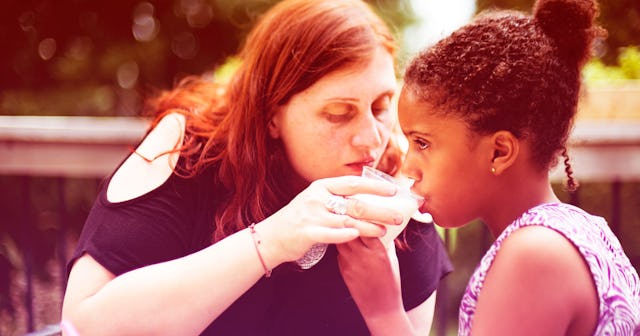Dealing With Relatives' Comments About My Neurodiverse Child Is Exhausting

I knew my child had something going on long before she was diagnosed. It was the way she’d crash into the sofa, over and over again, fall on the floor (hard) and laugh, and touch every single item on shelves when we’d visit the store. The more sensory input, the better. At the same time, any little sound could send her into overdrive, covering her ears and sobbing. Then there’s the boundless energy. My kid can bounce off the walls — literally.
We finally received a list of diagnoses. What some people call “labels,” we call confirmation of what we’d always known. Our child is neurodiverse, as we call it. The doctors affirmed what we already knew, bringing us immense relief. My attitude was that I finally had answers that could then assist us to seek the help our child needed to navigate the world. However, we have close relatives and friends who refuse to accept the diagnoses and instead, fight against the reality at every turn.
LSOphoto/Getty
I’ll never forget excitedly telling a close friend of mine, who has an undiagnosed neurodiverse child herself, that I was thrilled to move forward and get my kiddo started in some therapies. I talked about how the school would begin to amend my child’s IEP, making sure my child had access to all the same learning her peers did. I’d made a list of accommodations I felt would best serve my child, a list I’d take to her next meeting, including preferential seating and access to fidget toys and noise-canceling headphones. I was pumped to get the ball rolling.
My friend’s response floored me. She said, “The world won’t bend to her, you know. You can’t expect everyone to just make exceptions all the time.”
I couldn’t believe what she was saying to me. Accommodations aren’t exceptions to the rule. Accommodations are tweaks made to a child’s plan to make sure they are granted access to the same opportunities as their classmates. I admit, I was flabbergasted by my friend’s response, especially since her own child was immensely struggling in school due to lack of diagnosis and support. Maybe she was projecting or just having a bad day, but I learned that she wasn’t going to be a source of support and encouragement.
https://www.instagram.com/p/CQMdu7LD3L9/
The reaction from some relatives was far more hurtful. My own in-laws would say things like, “All kids are active!” or “She just needs to focus.” One relative, a retired school teacher, commented how she would never put up with such disrespect from a child. (Ahem, a child having a sensory meltdown over the texture of her shorts isn’t being disrespectful.) One suggested that a “good spanking” might be in order, because clearly, our child just needed a “heavy hand” and less coddling.
I had other friends offer fruitless suggestions, like enrolling my daughter in karate. As if a few kicks and punches would somehow change her brain chemistry and rid her of her disorders. They’d often offer discipline suggestions, and I had to remind them that certain diagnoses, like ADHD, don’t exist due to a lack of discipline. Newsflash, these diagnoses aren’t cured by discipline, either.
I learned early on not to put a stop to conversations like these real quick. If someone comes from a place of experience and empathy, I’m all ears. I am uninterested in unsolicited advice from those who merely want to rain down their uneducated lectures upon us regarding our child. Not only this, but when they focus so much on the perceived problems with our child, they fail to see all the beauty in them.
I wish more relatives and friends would take the time to get educated on my child’s diagnoses. If they would, they would know that digging in my parental heels and insisting a child “do as I say” doesn’t work for almost any kid, but certainly not a child who is neurodiverse. We have learned to think outside the box, to learn from professionals, and to take a trial-and-error parenting approach that also leans heavily on connection.
I don’t understand any person’s denial except that maybe they are hung up on the stigma of disabilities. To us, the diagnoses were gifts. They gave us a starting point to understand and work with our child. And by the way, disabilities aren’t something that needs to be fixed. There is nothing wrong with the child. These additional needs are something to adapt to, learn about, and grow from. I embrace my child in her entirety, not seeking to mold her into someone she is not.
Everything we do as parents stems from our education on our child’s needs, but also from our child’s individual situation. To have our parenting called into question, to feel that we must always play defense, is exhausting. As if parenting a neurodiverse child isn’t challenging enough, we then have to battle some of our nearest and dearest.
I’ve worked hard to offer our relatives and others close to us education, and I always correct their inaccuracies. I refuse to let my child feel shame regarding her needs. We fully accept our daughter, and we expect that with time, our loved ones will do the same. As much as I stand up for my child, sometimes I want to scream at the ignorant person, “You are the one with the problem! My child isn’t the problem!” Of course, that would hardly be effective, but it might be cathartic.
Our dedication to helping our kid succeed in life takes priority over any other person who feels the need to chime in. However, we will correct them, every time, without shame. Parenting my child is an honor, and I won’t allow any naysayers to get in the way of the joy for long.
This article was originally published on